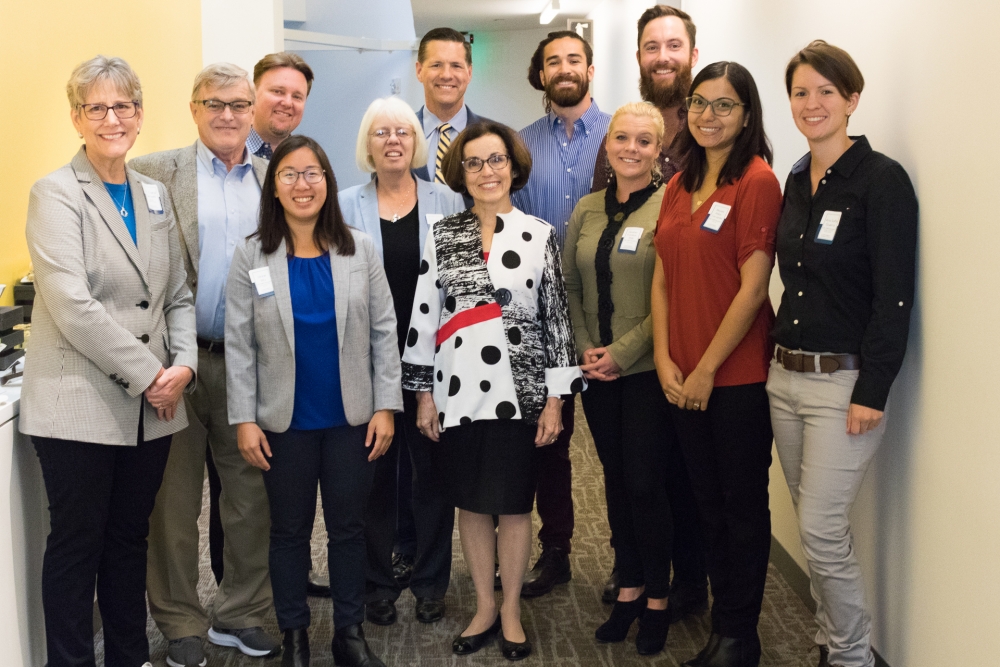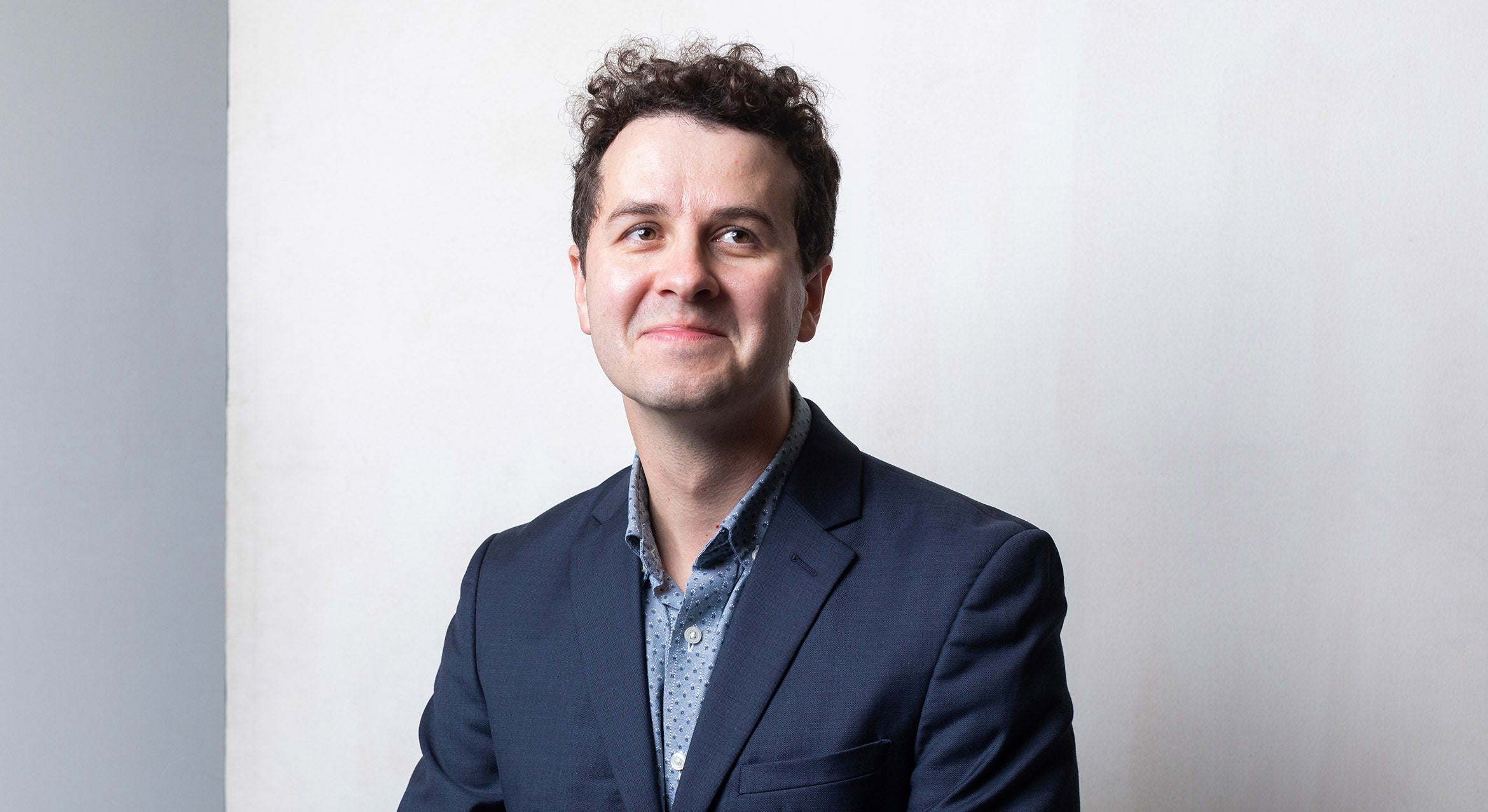
The Future of Funding
Returning to the campus she once served as vice chancellor of research, France Córdova, director of the National Science Foundation, visited UC Santa Barbara this week to tour research facilities, to discuss the future of research funding and to meet with graduate students whose work is being funded by NSF.
Córdova in a public talk addressed a capacity crowd of students, researchers and other members of the campus community about the agency’s strategic plan for research funding and highlighted past discoveries made possible by NSF support, from the internet to advances in 3D printing and the detection of gravitational waves, a discovery several decades in the making.
“We fund research before we know what’s going to come of it,” said Córdova, “[or] if it will matter at all.”
She went on to discuss the NSF’s 10 Big Ideas meant to guide them in the coming years, including heavy investments in data science and the future of humans and technology in the smart workplace. In addition, the agency is making a big push in multi-messenger astronomy and quantum research. UC Santa Barbara has already benefitted from this initiative in the form of a $25 million NSF grant to establish the new Quantum Foundry.
Further, the NSF will begin bridging the funding gap between projects under $10 million and those over $100 million, which will complement its work to expedite funding for endeavors that are especially promising Córdova noted. “What we’re trying to do is accelerate research where we can see light at the end of the tunnel,” she said.
Also among the agency’s near-future plans, according to Córdova: a redoubling of NSF efforts to broaden participation in STEM fields. “Our hope is that we can move the needle in inclusion, and with a particular emphasis on women and underrepresented minorities,” she said.
Ultimately, Córdova praised the growing conscientiousness and optimism among researchers today. “I think it’s great to live at a time when we care about the people and the conduct of research in the addition to the research itself,” she said, “because we don’t want to turn anybody away from this.”
Córdova’s visit to campus also included a special luncheon, hosted by Graduate Dean Carol Genetti, with a small group of UC Santa Barbara graduate students who have received the NSF Graduate Research Fellowship award.
“It is a great honor for the campus to have a visit from the highly esteemed director of the National Science Foundation,” said Genetti. “The Honorable Dr. Cordova has an extraordinary record of accomplishment and has made a tremendous impact on the entire scientific enterprise in the United States and beyond. Yet it is good to remember that she was once a graduate student too, and that it all started with a doctorate. I am sure many students will see in her a superb role model and will be inspired to use their own educations as a tool for positive change.”
Nearly $4 million in 2018 went to support graduate student research at UCSB through the NSF Graduate Student Research Fellowship Program (GRFP).
Currently, 127 UCSB graduate students are funded by the NSF GRFP. Fellows benefit from a three-year annual stipend of $34,000 along with a $12,000 cost of education allowance for tuition and fees (paid to the institution), opportunities for international research and professional development, and the freedom to conduct their own research at any accredited U.S. institution of graduate education they choose.
"NSF is an important funder of graduate education at UCSB through the GRFP, the many grants across campus that fund our students as graduate student researchers, and in providing grant support for Graduate Division initiatives related to interdisciplinary education, professional development, and diversity,” said Mary Hegarty, associate dean of Graduate Division, who leads research at the NSF-funded UCSB Spatial Thinking Lab in the Psychological & Brain Sciences Department.
An $8.1 billion independent federal agency — the only government agency charged with advancing all fields of scientific discovery, technological innovation and STEM education — the NSF last year awarded UCSB researchers over $49 million in grants to departments, centers, labs and programs across campus.
Córdova is the 14th director of the NSF, nominated by President Barack Obama in 2013 and subsequently confirmed by the U.S. Senate. A leader in science, engineering and education for more than three decades, her contributions in multi-spectrum research on x-ray and gamma ray sources and space-borne instrumentation have made her an internationally recognized astrophysicist.
She is president emerita of Purdue University, chancellor emerita of the UC Riverside and former vice chancellor for research at UC Santa Barbara. During her tenure at UCSB, Córdova initiated a "Research Across Disciplines" program that funded and encouraged both interdisciplinary and "blue sky" projects.
Córdova also served as NASA's chief scientist and is a recipient of the agency's highest honor, the Distinguished Service Medal. Prior to joining NASA, Córdova was the astronomy department head at Penn State and deputy group leader at Los Alamos National Lab.
She received her B.A. from Stanford University and her Ph.D. in physics from the California Institute of Technology.



